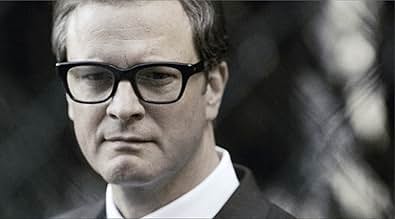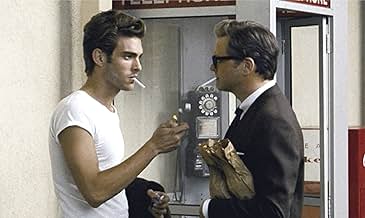An English professor, one year after the sudden death of his boyfriend, is unable to cope with his typical days in 1960s Los Angeles.An English professor, one year after the sudden death of his boyfriend, is unable to cope with his typical days in 1960s Los Angeles.An English professor, one year after the sudden death of his boyfriend, is unable to cope with his typical days in 1960s Los Angeles.
- Director
- Writers
- Stars
- Nominated for 1 Oscar
- 39 wins & 59 nominations total
- Director
- Writers
- All cast & crew
- Production, box office & more at IMDbPro
Featured reviews
Firth, always elegant and fascinating, plays George Falconer, a British professor in 1960's Los Angeles trying to cope with the death of his long-term partner, Jim (Matthew Goode). It's been eight months since Jim's death, and George decided to end his life by the end of the day – and it's this day we see in this admirable film. George spends time with his best friend Charley (the always wonderful Julianne Moore), with whom he had something in the past (and still has hopes of winning him over again), and now is an unhappy divorcée. A young pupil, Kenny (Nicholas Hoult, who has grown up a lot since "About a Boy" and "The Weather Man"), who clearly is infatuated with George, harasses him until he finally gives him the attention he craves. These two different encounters will be decisive for George. As sad as the overall tone and the theme of mourning can be, "A Single Man" is by no means depressing. Ford uses and abuses of "artsy", but very efficient and intriguing camera angles, and a classy score by Polish composer Abel Korzeniowski. Eyes, lips are shown in evidence throughout the film, and naturally, the costumes are all superb.
George's long day's journey reminds me a lot of Virginia Woolf's classic "Mrs. Dalloway". Marleen Gorris was able to do a correct but somewhat cold adaptation of Woolf's novel in 1997 (scripted by Woolf scholar and talented actress Eileen Atkins, featuring the magnificent Vanessa Redgrave in the title role), but I thought she wasn't much to blame for the film's coldness since that's one of the most complex novels to be translated to the screen. After seeing "A Single Man", I even dare to say Tom Ford could do an interesting and very personal adaptation of "Mrs. Dalloway". Also, this is one of the sexiest films since Alfonso Cuaron's "Y Tu Mama Tambien" (2001) and Bernardo Bertolucci's "The Dreamers" (2003), and Nicholas Hoult's incandescent presence has a lot to do with that. He gives an efficient, brave performance for an actor his age, and although I'm sure Jamie Bell ("Billy Elliot"), who was the first choice for the role, would've been terrific, Hoult doesn't disappoint. It's not every day we're given a film with such emotional intensity and exuberant sensuality, and "A Single Man" proves that Tom Ford is certainly a promising director, having given us not just a great first film, but one also one of the year's finest and most unusual creations. A film to be felt and celebrated, and I can't wait for the DVD - it's a keeper. 10/10.
A Single Man is not the typical romantic movie or the drama. It speaks of a social reality which many of us may try to avoid or turn the blind eye. And the exquisite quality in the dramatic movie making just cannot get better than this. And the plot delivers more than just sex and a total different perspective of love and attraction.
The movie is filled with brief cutaways, insightful dialogues and minor details which pack the screen with subtle beauty. The cinematography is elegant and creates a whole mood for the plot and its flow. The weight of loneliness and grief combined with the uncertainty totally engulfs the audience.
Collin Firth delivers a totally mesmerizing performance no doubt. Each scene and each line is dramatically perfect. His character speaks of emotion, survival, intelligent and ego.
If you taste is for dramas and dramas that makes a different then 'A Single Man' will not fail you.
It is a bleak introduction to Tom Ford's adaptation of Christopher Isherwood's novel, a powerful examination of the struggle to get over a loss but what would you expect from a movie whose first screen title is "Fade to Black"? The movie is emotionally loaded and restrains itself so much you can sense the electricity before the storm, but we get to have a few sunny flashbacks to understand that George wasn't born a misanthropic sourpuss. That the film features a same-sex couple is almost incidental, there's no sex scene and the smaller moments the better: a cozy conversation on a sofa, a discussion about the past in a beach, yet "A Single Man" couldn't have been as powerful with a man and a woman and for that, you can't do without the film's context.
The story is set in the midst of the Cuba missiles crisis when the world's future was hanging on a thread and America was the leader of the Free World, but with a rather selective approach of freedom as far as personal lifestyles went. A man couldn't live his sexuality if it wasn't the "right one", living as a homosexual was an ordeal in the public sphere and in private, it was tougher to find someone. Yet George found one and could conceal under a façade of pure clean-cut British rigidity his real self. With Jim, he found not just love but authenticity in a world that relied too much on slogans (mostly political), appearances and hypocrisy. It's interesting that the couple in this film can work as a metaphor for being free or true to our nature under a society not much traditional as it was reactionary (American values against the Red Scare).
There's an important scene where George lectures his student about fear, using World War II and racism as examples, and the notion of fear is connected to causes that can be either real or factice. The point is that everything has a cause, not all the causes are real, but they exist as fabricated. What matters then is the truth, tending to it, whether through History or from experience: one of his student Kenny (Nicholas Hoult) hates the past and is scared by the future (during the Cuban crisis, many people were), what's left from it? Maybe the present and the way it might build him to his own realizations and understanding of the world. This is basically the premise of that harrowing journey where George contemplates his life and the probability of its termination.
And if anything, the film isn't about the struggles of homosexuals in the 60s, though there are references to the prevailing homophobia, it's about someone who lost the balance of his life, the personal tunnel to his own truth, the link between the present and the future, and condemned himself to isolation then suicide because there was no future to conceive with anyone. He has a friend named Charley (Julianne Moore), she's divorced, disillusioned about life, but she loves him and for all the joyful and fun moments they spend together (Firth and Moore have great chemistry), George can't connect the present with her to any bright vision of the future. The film says something about the value of the present as one step that makes you climb the stairs of your life. It's only after he meets again Kenny, the student who admires him (and a little more) that he starts feeling the stairs can be worth climbing.
But that's only an interpretation of the story, one must take the film at face value and appreciate its "present"; a man drowning in an ocean of loneliness that gives its full meaning to the title, so isolated a man that he actually raises the interest of people around him because -and maybe George doesn't realize it himself- he's still part of his world. The film makes no secret about George's planned suicide but it's expressed in an interesting way: he lives the last day at its fullest, staring at muscular tennis players' bodies as if he was photographing them in his mind, a beautiful blonde girl's hair, he caresses a dog who reminds him of his friend's. These moments are so intense that it might leave the impression that Tom Ford over-designed his film, made it too stylish for its own good as if he was trying to channel Bergman.
I didn't mind that actually, it's interesting that the more intensely George looked at his world, the more it meant his preparation to death, looking at the pink smog of L.A., he says that even the ugliest thing have a beautiful side, as if people focused on beauty had the ugliest thoughts and missed the best part of what living is about. When he meets the young Spanish model, it's romantic in an artificial and abrupt way, when he meets Kenny again, they go swimming, the present doesn't reveal any truth but shows him a way like it almost saved his life at a tragicomic moment involving a gun and the right pillow position to pull the trigger. If you can't envision a bright future, trust the present's small moments to take you there...
Storyline
Did you know
- TriviaOn February 21, 2010, when he won a BAFTA for Best Actor, Colin Firth's list of people to thank included the man who repaired his refrigerator. Firth explained that he'd decided to turn down the part, and had an email to director Tom Ford in his outbox, waiting to be sent. Then a man arrived to repair his refrigerator, and Firth had time to reconsider.
- GoofsAt the end of the movie, the bandage that Kenny puts on George's forehead doesn't entirely cover the cut. In the next shot, it does.
- Quotes
George: [last lines; voiceover] A few times in my life I've had moments of absolute clarity, when for a few brief seconds the silence drowns out the noise and I can feel rather than think, and things seem so sharp. And the world seems so fresh as though it had all just come into existence. I can never make these moments last. I cling to them, but like everything, they fade. I have lived my life on these moments. They pull me back to the present, and I realize that everything is exactly the way it was meant to be.
- Crazy creditsThe production company, Fade to Black, is displayed in the opening, shown in white lettering outlined against a white background. It fades to white.
- ConnectionsFeatured in The Rotten Tomatoes Show: 2012/The Messenger/Fantastic Mr. Fox (2009)
- SoundtracksLe Serpent qui Danse
Lyrics by Charles Baudelaire
Music by Serge Gainsbourg
Performed by Serge Gainsbourg
Courtesy of Mercury France
Under license from Universal Music Enterprises
Details
- Release date
- Country of origin
- Languages
- Also known as
- Người Đàn Ông Cô Đơn
- Filming locations
- Production companies
- See more company credits at IMDbPro
Box office
- Budget
- $7,000,000 (estimated)
- Gross US & Canada
- $9,176,000
- Opening weekend US & Canada
- $217,332
- Dec 13, 2009
- Gross worldwide
- $24,964,890
- Runtime1 hour 39 minutes
- Color
- Sound mix
- Aspect ratio
- 2.35 : 1
Contribute to this page






































